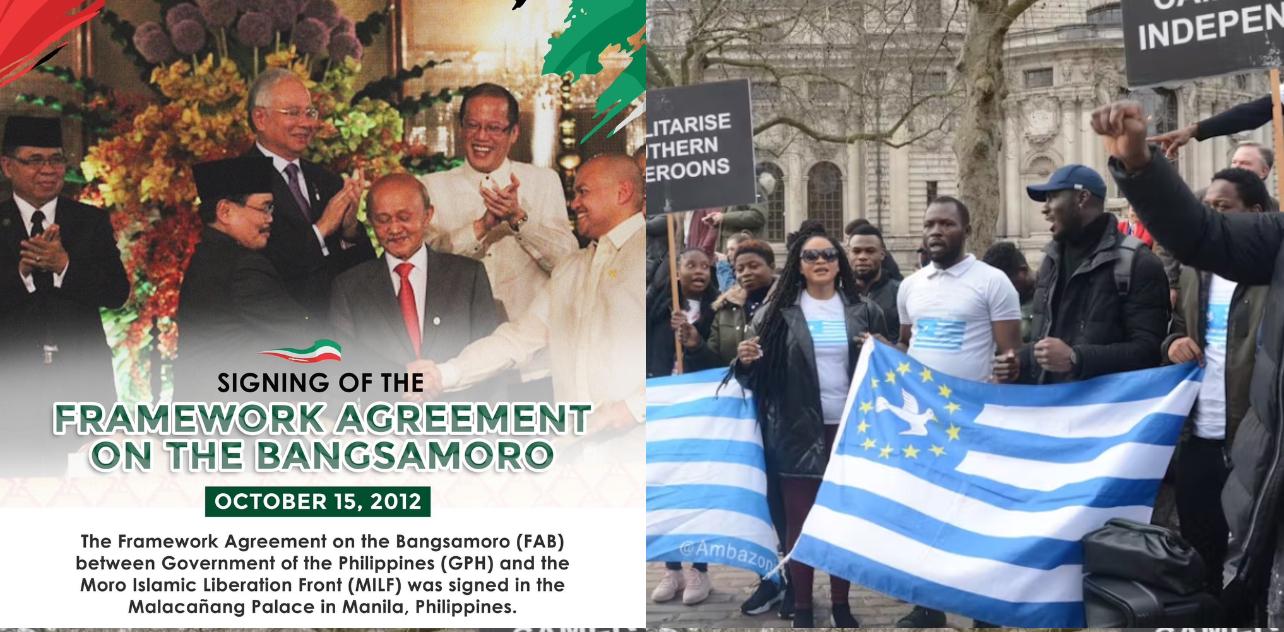Conflicts rage on, leaving devastation and displacement in their wake. But amidst the chaos, there’s hope. The Bangsamoro peace process in the Philippines offers valuable lessons for Ambazonia’s struggle for self-determination in Cameroon.
A Shared History of Marginalization
In Mindanao, the Muslim minority has long felt erased by the Christian-dominated government. Similarly, Ambazonia’s Anglophone regions feel suffocated by Cameroon’s Francophone central government. Both conflicts stem from colonial history, cultural differences, and denied autonomy.
The Human Cost of War
Years of guerrilla warfare and violent confrontations have scarred both regions. Families torn apart, livelihoods destroyed, and dreams shattered. But amidst the rubble, a glimmer of hope emerged in Bangsamoro.
A Path to Peace: The Framework Agreement on Bangsamoro
The Moro Islamic Liberation Front (MILF) chose negotiation over war, resulting in the Framework Agreement on Bangsamoro (FAB). This groundbreaking agreement created the Bangsamoro Autonomous Region, giving the Moro people control over local governance, natural resources, and cultural rights.
Can Ambazonia Follow Suit?
Ambazonia’s armed resistance has led to devastating consequences. But what if there’s a better way? Could a similar negotiation approach bring peace? The Peace Plant Paper, championed by Capo Daniel, offers a glimmer of hope.
Autonomy: A Middle Ground
The Bangsamoro Autonomous Region addressed self-governance concerns while maintaining the Philippines’ territorial integrity. Could Ambazonia explore similar autonomy? Regional autonomy or a federated system might alleviate Anglophone grievances, offering a peaceful middle ground.
International Support: A Crucial Factor
International mediation and support legitimized the Bangsamoro peace process. Ambazonia could benefit from similar backing. Canadian-led talks between the Cameroon government and separatist leaders offer a promising start.
Challenges Ahead
Hardline factions opposed the FAB, but persistence and international support ensured its success. Ambazonia faces similar challenges, but a negotiated autonomy agreement could bring stability.
A Call to Action
The Bangsamoro peace process shows that even deeply rooted conflicts can be resolved through negotiations respecting local identity and aspirations. Ambazonian leaders can learn from this example, embracing negotiation and autonomy as viable alternatives to war.
The Framework Agreement on the Bangsamoro (FAB) and the Ambazonian conflict in Cameroon share striking similarities in terms of grievances, aspirations, and potential strategies for addressing these issues.
Historical Grievances and Identity
In Mindanao, the Muslim minority has long felt marginalized by the majority Christian government of the Philippines, fueling conflicts over identity, land rights, and political autonomy. The Moro people seek greater self-determination, citing historical sovereignty prior to colonization.
Similarly, Ambazonia’s Anglophone regions, historically part of British Cameroon, feel marginalized by the Francophone-dominated central government. Ambazonians demand autonomy or independence, citing cultural, linguistic, and governance differences rooted in colonial history.
Armed Struggle vs. Negotiated Peace
After years of guerrilla warfare, the Moro Islamic Liberation Front (MILF) negotiated with the Philippine government, resulting in the FAB. Signed in 2012, it established the Bangsamoro Autonomous Region, enabling self-governance while maintaining the Philippines’ territorial integrity.
In Ambazonia, armed resistance has led to displacement, destruction, and loss of life. However, groups like PRAP (People’s Rights Advocacy Platform), led by Capo Daniel, recognize negotiation as a viable solution, potentially modeled after the Bangsamoro agreement.
Autonomy as a Solution
The Bangsamoro Autonomous Region gives the Moro people control over local governance, natural resources, and cultural rights, maintaining the Philippines’ territorial integrity. A similar approach could benefit Ambazonia, where regional autonomy or a federated system might address Anglophone grievances.
International Mediation and Peacebuilding
International actors, including Malaysia and the United Nations, supported the Bangsamoro peace process. Similarly, international mediation has been proposed in the Ambazonian conflict, with Capo Daniel participating in Canadian-led talks.
Challenges to Implementation
The FAB faced opposition from hardline factions and skepticism from the Filipino population. However, persistence and international support ensured its success. Ambazonia may face similar challenges, but a negotiated autonomy agreement could bring stability.
Lessons for Ambazonia
Ambazonian leaders can achieve significant self-governance through negotiation, avoiding prolonged armed struggle. An autonomous status, similar to the Bangsamoro model, could preserve cultural and political rights while mitigating conflict risks.
The Bangsamoro peace process demonstrates that deeply rooted conflicts can be resolved through negotiations respecting local identity and aspirations. Capo Daniel’s call for Ambazonians to embrace the Peace Plant Paper echoes this model, offering a peaceful alternative to war.
Let’s choose the path to peace.


